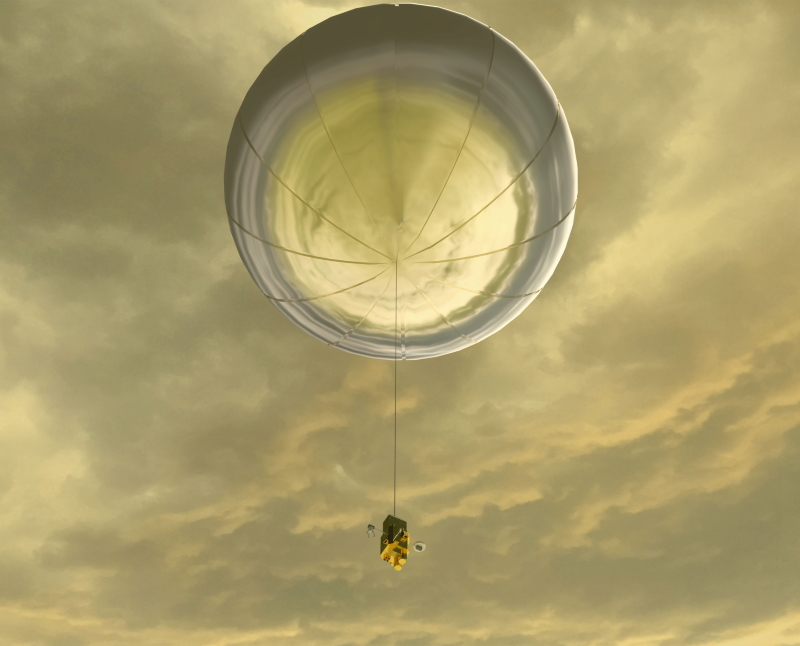

Deimos-One to Build Robotic Spacecraft for Venus Mission
Las Vegas, Nevada, 29th July 2021
The CAELESTIS Mission will send an AI-powered swarm of robotic probes to look for signs of life.
Deimos-One, the private aerospace and space travel company, today announced its plans to develop a robotic spacecraft for a scientific mission to Venus.
The proposed mission, named “CAELESTIS”, will send an AI-powered swarm of robotic probes to study Venus’ dense atmosphere, topography, and geologic processes – and look for signs of life.
The company aims to discover how Venus – which may have been the first potentially habitable planet in our solar system – transformed from a temperate world with rivers, lakes, and oceans, into a dry hellscape planet with crushing atmospheric pressures and temperatures hot enough to melt lead. It will make one of the first returns to Earth’s sister planet in more than thirty years.
Deimos-One co-founder and CEO, Jamin Thompson, said: “We believe habitable pockets may have existed in Venus’ atmosphere for millions, perhaps even billions of years; and that they may still even exist today. To find out for sure, we’re going to go have a look around and see if there may be anything interesting hiding in the Venusian atmospheric zone, and I’m excited to see what we can find. There’s no guarantee we’ll find anything, but regardless of the scientific returns, this mission will be a game-changer that shows the world it’s possible to do major space missions privately now.”
Unlike previous missions to the planet, which have relied on orbit insertion, the CAELESTIS probes will make direct atmospheric entry. The mission sequence will consist of an Earth launch and escape, Venus arrival, direct atmospheric entry and descent, balloon deployment, balloon failure, and a surface landing.

Upon balloon deployment, the probes will begin to survey and measure the composition of Venus’ atmosphere, collect samples, and capture high-resolution photographs while hovering at roughly 55 km above the planet’s surface. The probes will continue balloon-assisted hover operations until the onset of balloon failure, where they will continue their descent and make surface landing for continued operations.
The mission will leverage a unique, multi-dimensional viewpoint of the Venusian environment to study the poorly understood meteorology of the middle cloud region and search for macroscopic life signatures within the atmospheric habitable zone.
“In the past, planetary exploration missions like these used to cost hundreds of millions of dollars and would take ten years to launch. The CAELESTIS mission will demonstrate a more cost-effective, efficient, faster development model that will be one of the first of its kind to deliver big science in a small package. We believe this approach will increase the science community’s access to the solar system and allow us to learn a lot more, much faster,” stated Thompson.
The spacecraft are planned for launch in 2023, ridesharing aboard a commercial launch vehicle
About Deimos-One
Deimos-One is an aerospace and space travel company, pioneering human spaceflight and space exploration for individuals and researchers, as well as a designer and developer of advanced multi-use space vehicles and robotic systems. It is developing a spaceflight system designed to support complex research missions in our solar system and beyond. You can find more information at https://deimosone.com/
For media inquiries:
Evie Sloan – Vice President Communications | evie@deimosone.com | Tel: 702.330.5650
Deimos-One is at the frontier of scientific research and space exploration
We are developing solutions to help us better understand our universe and improve the human experience. Combining rigorous academic research with state-of-the-art space technology, we hope to make discoveries that will improve life on Earth and promote a cleaner, safer, sustainable world.
Exploration
We are focused on developing spaceflight technology that will reduce the cost of access to space and provide for more research opportunities in our solar system and beyond.
Sustainability
We are committed to building a future where access to space is affordable, frequent, and reliable for everyone – our next-generation family of American made space vehicles will power us into this reality.
Mission
Our mission is to build an interplanetary pathway that connects earth to the universe around it. Our space vehicles are built to support a better future and promote a cleaner, safer, sustainable World.
